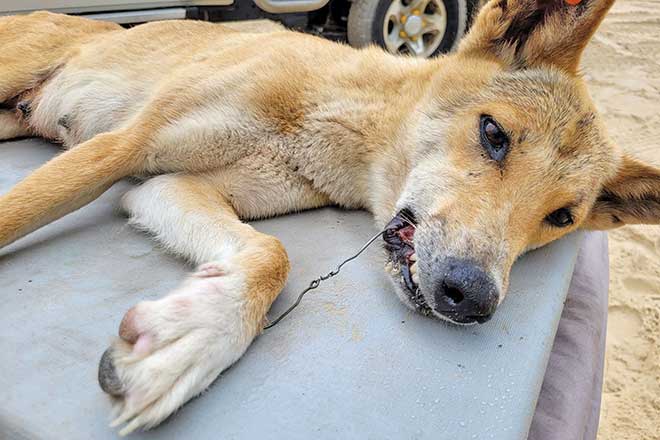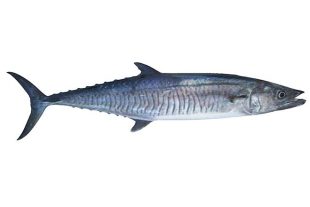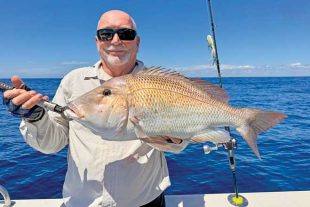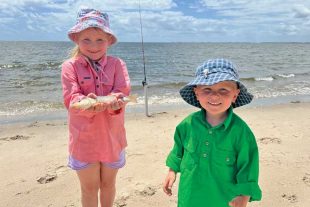Rangers have captured and sedated another dingo on K’gari (formerly Fraser Island) to remove a large set of gang hooks from the animal’s mouth and foot.
The gang hooks had become deeply embedded into the dingo’s jaw, and as she tried to use her right foot to remove them, the third hook snagged her leg.
The adult female dingo’s right paw was then hooked beside her jaw.
She was observed in distress around the Orchid Beach region and the Department of Environment, Science and Innovation received multiple reports from visitors to K’gari.
Ranger Dan Novak said the hook injury incident was one of the worst he had seen on the island.
“The Queensland Parks and Wildlife Service would like to thank everyone who reported the incident to us,” Mr Novak said.
“Initial reports suggested the three hooks were stuck in her mouth and she was trailing a length of fishing line.
“She could not walk properly, could not hunt nor eat, and was obviously in distress,” he said.
“Without intervention, the injuries had the potential to be fatal.
“To make matters worse, the dingo is feeding pups, so rangers had to act swiftly to remove the hooks and on August 12, she was sedated, the hooks were gently removed, and the wounds sterilised.
“Less than 24 hours after receiving the initial report, the dingo had been captured, treated and ran free and went back to her den,” he said.
Winter is considered tailor season on K’gari.
Since July 1, more than 11,500 people stayed at least one night in a camping area managed by the Queensland Parks and Wildlife Service, and more than 4700 vehicle access permits have been provided to visitors.
Ranger Novak said rangers have already removed hooks and fishing line from several dingoes around the Orchid Beach area due to the influx of fishers.
“We believe most incidents have involved fishing gear that has been taken back to camp and the fisher has not removed the bait from the hooks,” he said.
“Every fisher who visits K’gari has to remove all bait from their hooks after their fishing session is over and preferably cover the exposed hooks with a protector.
“Dingoes are extremely opportunistic, and they will scavenge around camping areas, which is why it is so important to remove bait from all hooks.
“The next dingo may not be so lucky, especially if it swallows a hook, so we need all fishers to follow K’gari’s five basic fishing rules.
“Some incidents have involved dingoes grabbing a fisher’s catch as they reel it in, so all fishers need to follow the Be dingo-safe! rules and move dingoes on.”
To help prevent hooking wildlife, follow K’gari’s five basic fishing rules:
- Dispose of broken or leftover gear properly
- Never leave behind fishing line, hooks, lures or bait
- Do not release fish that still have hooks in them
- Remove all bait from hooks when packing up
If you unintentionally hook an animal while fishing or see an animal impacted by hooks, contact Queensland Parks and Wildlife Service immediately.
Report all wildlife entanglements with fishing equipment to rangers by calling 07 4127 9150 or emailing dingo.ranger@des.qld.gov.au as soon as possible.
Visitors to K’gari are reminded to ‘Be dingo-safe!’ at all times:
- Always stay within arm’s reach of children and young teenagers
- Always walk in groups and carry a stick
- Camp in fenced areas where possible
- Do not run. Running or jogging can trigger a negative dingo interaction
- Never feed dingoes
- Lock up food stores and iceboxes, even on a boat
- Never store food or food containers in tents
- Secure all rubbish, fish and bait.
View further information on K’gari dingoes at parks.desi.qld.gov.au/parks/kgari-fraser/about/wongari-dingoes
 Bush ‘n Beach Fishing Magazine Location reports & tips for fishing, boating, camping, kayaking, 4WDing in Queensland and Northern NSW
Bush ‘n Beach Fishing Magazine Location reports & tips for fishing, boating, camping, kayaking, 4WDing in Queensland and Northern NSW









